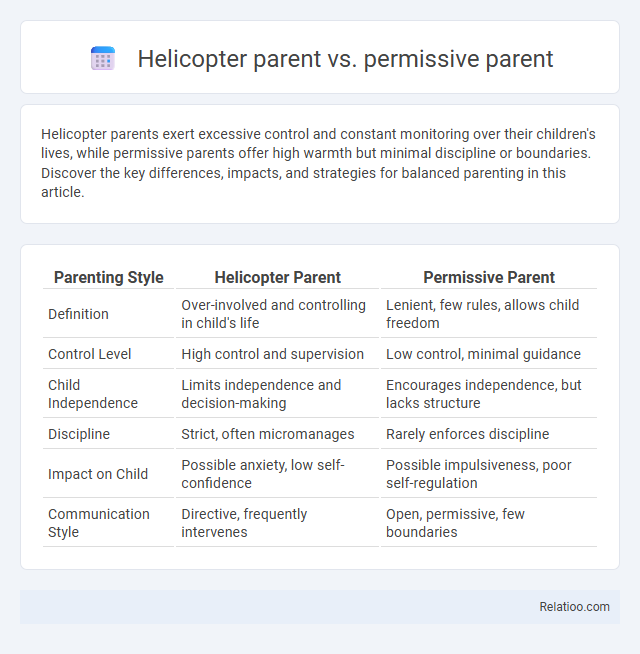Helicopter parents exert excessive control and constant monitoring over their children's lives, while permissive parents offer high warmth but minimal discipline or boundaries. Discover the key differences, impacts, and strategies for balanced parenting in this article.
Table of Comparison
| Parenting Style | Helicopter Parent | Permissive Parent |
|---|---|---|
| Definition | Over-involved and controlling in child's life | Lenient, few rules, allows child freedom |
| Control Level | High control and supervision | Low control, minimal guidance |
| Child Independence | Limits independence and decision-making | Encourages independence, but lacks structure |
| Discipline | Strict, often micromanages | Rarely enforces discipline |
| Impact on Child | Possible anxiety, low self-confidence | Possible impulsiveness, poor self-regulation |
| Communication Style | Directive, frequently intervenes | Open, permissive, few boundaries |
Understanding Helicopter Parenting
Helicopter parenting involves closely monitoring and controlling a child's experiences to prevent failure, often leading to reduced independence and problem-solving skills. In contrast, permissive parents offer minimal boundaries and emphasize freedom, which can result in poor self-discipline and accountability in children. Understanding helicopter parenting helps you identify its impact on emotional development and encourages a balance between guidance and autonomy for healthier growth.
Key Traits of Permissive Parents
Permissive parents are characterized by high responsiveness and low demands, often allowing children significant freedom with minimal discipline. They prioritize nurturing and acceptance, rarely setting firm boundaries or enforcing consistent rules, which can lead to challenges in children's self-regulation and responsibility. Your approach as a permissive parent may foster creativity and independence but could also hinder the development of important behavioral limits.
Major Differences Between the Two Styles
Helicopter parents intensely monitor and intervene in their child's life to prevent any failure or struggle, while permissive parents tend to be lenient, offering minimal discipline and more freedom, often lacking consistent boundaries. Unlike permissive parents, helicopter parents exhibit high involvement but low autonomy granting, which can lead to overdependence in children. Your understanding of these styles can help foster a balanced parenting approach that encourages responsibility while providing necessary support.
Effects on Child’s Emotional Development
Helicopter parents often micromanage their child's experiences, which can hinder the development of independence and problem-solving skills, leading to increased anxiety and low self-esteem. Permissive parents, by setting few boundaries, may cause children to struggle with self-discipline and emotional regulation, resulting in impulsivity and poor frustration tolerance. Your child's emotional development thrives when balanced parenting approaches promote autonomy while offering consistent support and guidance.
Academic Outcomes: Helicopter vs Permissive
Helicopter parents often closely monitor and intervene in their children's academic activities, leading to higher grades but sometimes reduced problem-solving skills and independence. Permissive parents tend to allow more freedom and less academic supervision, which can result in lower academic achievement but higher creativity and self-expression. Studies suggest helicopter parenting correlates with immediate academic success, while permissive parenting may impact long-term motivation and personal development.
Impact on Social Skills and Independence
Helicopter parents, who closely monitor and intervene in their children's activities, often hinder the development of independence and social skills by limiting opportunities for autonomous decision-making and peer interaction. Permissive parents, characterized by high responsiveness but low demands, may promote social warmth but risk fostering dependency and poor self-regulation due to lack of boundaries. In contrast, authoritative parents balance guidance and freedom, supporting healthy social skills and independence by encouraging responsibility and effective communication.
Common Challenges Each Parenting Style Faces
Helicopter parents often struggle with fostering independence in their children, leading to increased anxiety and lack of problem-solving skills. Permissive parents face challenges in setting boundaries, resulting in children who may exhibit poor self-discipline and difficulty in handling authority. Your approach can impact how effectively challenges like behavioral issues and emotional regulation are managed within these distinct parenting styles.
Long-term Consequences for Children
Helicopter parents often create long-term consequences such as reduced child autonomy and increased anxiety, as constant oversight can hinder decision-making skills. Permissive parents may lead to children exhibiting poor self-discipline and difficulty respecting boundaries, potentially resulting in challenges with authority and responsibility. Balancing parental involvement is crucial to foster resilience and independence, preventing the extremes of overprotection and excessive leniency.
Tips for Balancing Involvement and Freedom
Balancing involvement and freedom requires recognizing the differences between helicopter, permissive, and authoritative parenting styles to support your child's growth effectively. Setting clear boundaries while encouraging independence helps prevent the overprotection of helicopter parenting and the lack of guidance seen in permissive parenting. Your goal should be to provide consistent support and allow safe experiences for your child to develop responsibility and confidence.
Choosing the Right Parenting Approach for Your Family
Choosing the right parenting approach depends on balancing guidance and freedom to foster children's independence and emotional growth. Helicopter parents tend to be overly involved in their child's life, often hindering problem-solving skills, while permissive parents offer too much freedom, potentially leading to a lack of discipline and boundaries. A balanced approach combines consistent support with appropriate autonomy, adapting strategies based on the child's temperament and family values to promote healthy development.

Infographic: Helicopter parent vs Permissive parent
 relatioo.com
relatioo.com